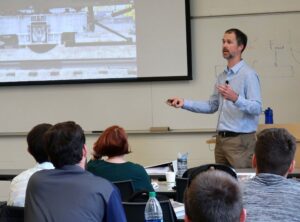 The University of Illinois has the strongest, most highly respected rail engineering program in North America and our graduates have excellent employment opportunities. Three rail transportation and engineering courses will be offered in the Fall 2020 semester. All three courses are approved options for advanced technical electives for a Primary or Secondary in Transportation Engineering. Additional information on the three Fall 2020 rail courses is provided below, including instructor contact information.
The University of Illinois has the strongest, most highly respected rail engineering program in North America and our graduates have excellent employment opportunities. Three rail transportation and engineering courses will be offered in the Fall 2020 semester. All three courses are approved options for advanced technical electives for a Primary or Secondary in Transportation Engineering. Additional information on the three Fall 2020 rail courses is provided below, including instructor contact information.
We hope to see you in one or more of these courses!
CEE 408 – Railroad Transportation Engineering
Rail transportation systems require infrastructure, vehicles, motive power and energy to move goods and people. Rail technology spawned a transportation revolution that continues to substantially influence national and global markets. This course begins with the fundamental economics of rail transportation. This is followed by consideration of railroad rolling stock design, running gear and other mechanical components, train braking system design, function, and dynamics, and locomotive design, operation and function. The course covers quantitative analysis of train resistance, power and energy requirements, effects of aerodynamics, grade, and curvature, and their effect on speed, power, and acceleration. Railroad track system design, components, roadbeds, and maintenance needed to support safe and efficient movement of railway vehicles is also covered. The course concludes with an introduction to passenger rail transportation, high-speed rail, and the technical and operational challenges of increasing speed and frequency of passenger service on existing freight rail corridors.
Fall 2020 • Online Recorded Lectures and Live Discussion Group
Instructor: Professor – Christopher Barkan cbarkan@illinois.edu

CEE 409 – Railroad Track Engineering
Railroad track is the backbone of a railway network and a key element of the vehicle-track system. Its primary functions are to support and distribute train loads, guide rail vehicles and facilitate drainage. The safe and efficient movement of trains requires that track is properly designed, constructed, inspected and maintained. The objectives of this course are to provide the student with a fundamental understanding of basic railroad track engineering principles, concepts, practices and technologies. The course also includes the development of a comprehensive track design project in a team setting.
Fall 2020 • Tu/Th 2:00-3:20 PM • Online or 1311 Newmark Civil Engineering Lab
Instructors: Sr. Lecturer & Sr. Research Scientist – J. Riley Edwards jedward2@illinois.edu and Adjunct Professor – Conrad Ruppert ruppertc@illinois.edu

CEE 412 – High-Speed Rail Engineering
This course provides an introduction to the development, engineering, design and construction of a high-speed rail (HSR) passenger transport systems with particular emphasis on the unique engineering elements of HSR technology. Students will learn about the features of the HSR system and its subsystems including: core systems (trains, power, signal, communication and control), track system and civil infrastructure (earthwork, bridges, viaducts and tunnels). The course also covers basic design and construction of HSR stations and rolling stock maintenance facilities.
Fall 2020 • Tu/Th 11:00-12:20 PM • Online or 3310 Newmark Civil Engineering Lab
Instructors: Adjunct Professor – Conrad Ruppert ruppertc@illinois.edu and Adjunct Professor – Tsung-Chung Kao tckao@illinois.edu



